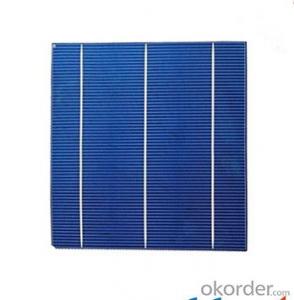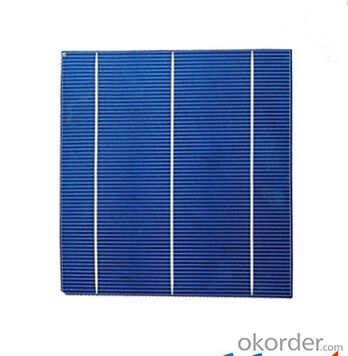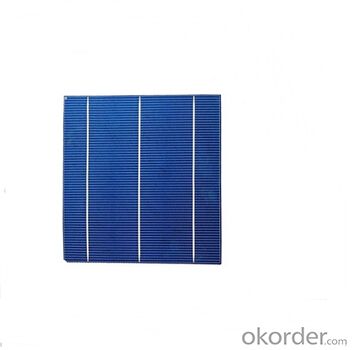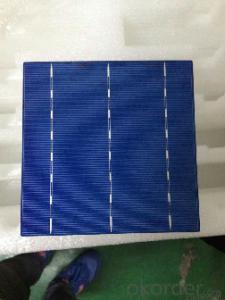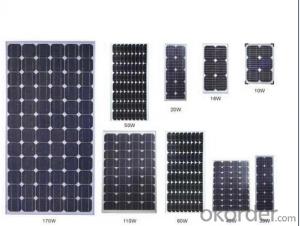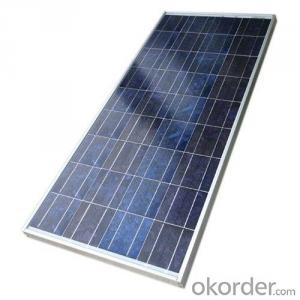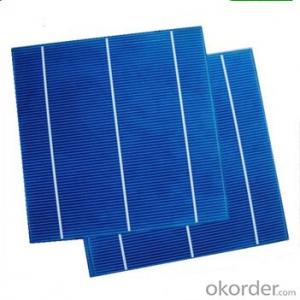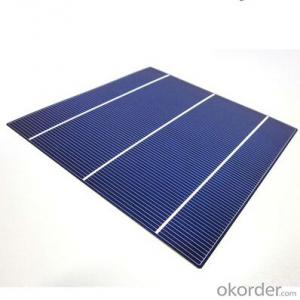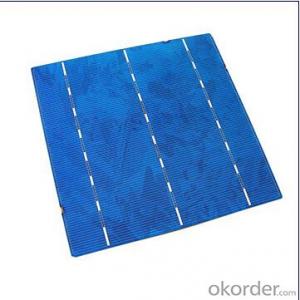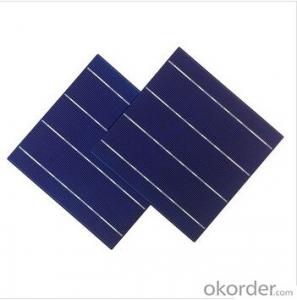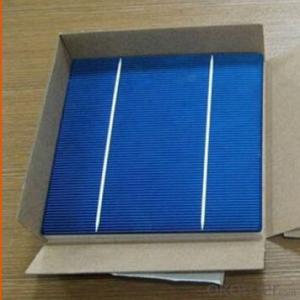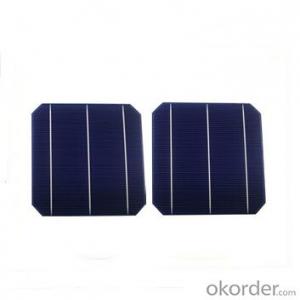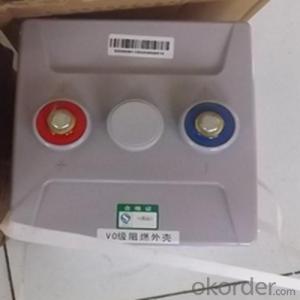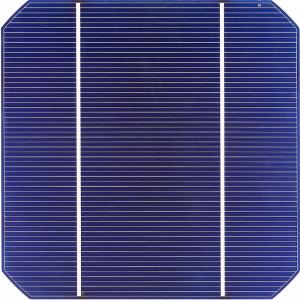Green Solar Cells - High Quality 17% Efficiency Polycrystalline Solar Cells
- Loading Port:
- Shanghai
- Payment Terms:
- TT OR LC
- Min Order Qty:
- 1000 pc
- Supply Capability:
- 1000000 pc/month
OKorder Service Pledge
OKorder Financial Service
You Might Also Like
Solar Cells:
Solar cells is made by solar wafer, it has three categories of solar cell right now, monocrystalline polycrystalline and thin film,These cells are entirely based around the concept of PN junction, which is the critical part of solar module, it is the part that can convert the light energy into electricity, the thickness is from 180um to 200um, with even busbars to conduct electricity, textured cell can decrease diffuse reflection; they are often electrically connected and encapsulated as a module. Photovoltaic modules often have a sheet of glass on the front (sun up) side, allowing light to pass while protecting semiconductor wafers from abrasion and impact due to wind-driven debris, rain, hail, etc. Solar cells are also usually connected in series in modules, creating an additive voltage. Connecting cells in parallel will yield a higher current;With high quality and stable quality. Our Cells can greatly improve the performance of Solar Modules.
Features:
High efficiencies up to 16.4%
Proven long term mechanical stability of silicone
Make of highly purified poly silicone
Three bus bars for reduced series resistance and improved module and cell efficiency
Blue anti-reflecting coating ensures improved light absorption and increased efficiency
Acid texturization offers a uniform appearance and virtually invisible crystal structure
Excellent low light behavior for improved energy yield
Specifications
Cell | poly |
Pmax(Power)* | 300 |
Vmpp(nominal voltage). V | 36.8 |
Impp(nominal current). A | 8.152 |
Voc(voltage open circuit). V | 46.09 |
Isc(short-circuit current). A | 8.66 |
Maximum voltage. V | 1000 |
Power tolerance | 0 to +3% |
* 2.NOCT: | 45Deg |
Operating temperature | -45/+80Deg |
Temperature coefficients of Voc (%) | -(2.23+/-0.1)mv/ °C |
Temperature coefficients of Isc (%) | 0.065+/-0.015%/ °C |
Junction box | IP65/4( protection degree / number of diodes) |
Front cover | Tempered Glass, 4.0mm (material / thickness [mm]) |
Cell Type (quantity / technology) | 72/POLY CELL 156X156 |
Encapsulation materials | EVA (Ethylene Vinyl Aceta |
Rear cover | Le – PET – PVDF / 0.287 |
Fram | Anodised aluminium profile(material / thickness [mm]) |
Max. wind load / Max. snow load [Pa] | 2.4K/5.4 K |
Length of Cables/connector | 900mm |
Dimension(LxHxD) in mm | 1957X992X50 |
Weight | 22.5KG |
This panel is made up of 72pcs 156x156mm Poly-crystalline cells. | |
40'HQ could load:560 pics (2 |
Solar Cells Advantage:
1. High efficiency and High power.
2. Long-term electrical stability.
3. Lowest price and Fastest delivery.
4. Good quality and good service.
5.Bulk supply
6. Good Warranty
7.Big Sale
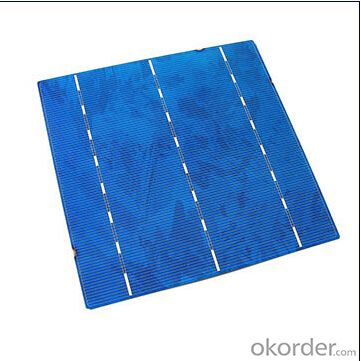
FAQ
We have organized several common questions for our clients,may help you sincerely:
①What price for each watt?
It depends on the efficiency of the solar cell, quantity, delivery date and payment terms.
②How long can we receive the product after purchase?
In the purchase of product within three working days, We will arrange the factory delivery as soon as possible. The pecific time of receiving is related to the state and position of customers.Commonly 7 to 10 working days can be served.
③Can you provide the peripheral products of the solar panels, such as the battery, controller, and inverter? If so, can you tell me how do they match each other?
Yes, we can, we have two companies for solar region, one is CNBM International, the other is CNBM engineering Co.
We can provide you not only the solar module but also the off grid solar system, we can also provide you service with on grid plant.
④What is your warranty of solar cell?
Our product can promise lower than 0.3% open box crack, we support claim after opening the box if it has crackm color difference or sth, the buyer should give pictures immediately, we can not accept the claim after the solar cell has assembled to solar panel.
• Timeliness of delivery
• ⑤How do you pack your products?
We have rich experience on how to pack the solar cell to make sure the safety on shipment, we could use wooden box or pallet as buyer's preference.
- Q: Can solar cells be used in sports stadiums?
- Yes, solar cells can be used in sports stadiums. They can be installed on the roofs or facades of stadiums to generate renewable energy, reducing the reliance on traditional sources of electricity. This can help lower operating costs and reduce a stadium's carbon footprint. Additionally, solar cells can provide shade in outdoor stadiums, enhancing the spectator experience.
- Q: Can solar cells be used in smart grid systems?
- Yes, solar cells can definitely be used in smart grid systems. Solar cells can generate electricity from sunlight, which can then be integrated into the smart grid to efficiently distribute and manage renewable energy. This allows for the seamless integration of solar power into the grid, reducing reliance on conventional energy sources and promoting a more sustainable and reliable energy system.
- Q: Doping and Diffusion Principle in Solar Cell Processing
- In some inorganic solid compounds doped with different metal ions, can be different properties of luminescent materials, such as yttrium oxide (III) doped with europium (III) ions can be red fluorescent materials.
- Q: Can solar cells be used for powering submarines?
- No, solar cells cannot be used as the primary source of power for submarines due to their limited efficiency and inability to generate sufficient energy for the demanding requirements of underwater operations.
- Q: What is the impact of solar cell installations on job creation?
- The impact of solar cell installations on job creation is significant. The growing demand for renewable energy has created a surge in the solar industry, leading to the creation of numerous job opportunities. Solar cell installations require skilled workers for design, installation, maintenance, and manufacturing, resulting in a wide range of employment opportunities across various sectors. Moreover, the shift towards solar energy creates a ripple effect, stimulating the local economy and supporting job growth in related industries such as construction, engineering, and manufacturing of solar components. Overall, solar cell installations have a positive impact on job creation by fostering a sustainable and green workforce.
- Q: How do solar cells perform in areas with limited sunlight?
- Solar cells perform less efficiently in areas with limited sunlight compared to areas with abundant sunlight. This is because solar cells rely on sunlight to generate electricity, and limited sunlight means less energy available for conversion. However, solar cells can still produce electricity in areas with limited sunlight, although at a lower rate, making it important to consider alternative energy sources or optimize the solar cell system's design for maximum efficiency in such areas.
- Q: How do solar cells perform in cloudy weather?
- Solar cells still generate electricity in cloudy weather, but their performance is reduced. Cloud cover reduces the amount of sunlight reaching the cells, resulting in decreased power output.
- Q: How do solar cells perform in humid climates?
- Solar cells can still perform well in humid climates, although their efficiency might be slightly reduced compared to dry climates. The moisture in the air can cause some scattering of sunlight and create a film of water on the surface of the solar panels, which can decrease their efficiency. However, advancements in solar cell technology have been made to mitigate the effects of humidity, such as using anti-reflective coatings and self-cleaning mechanisms. Overall, solar cells can still generate electricity effectively in humid climates.
- Q: I am a purchasing manager for a EPC engineering company, and we are planning to purchasing some 4bb solar cells for one of our project in Taiwan, can I get a quotation online?
- We do have 4bb solar cells, but we also have 125Mono &156 Multi&Mono 2BB&3BB&4BB A grade solar cell.
- Q: Can solar cells be used in weather monitoring systems?
- Yes, solar cells can be used in weather monitoring systems. Solar cells are used to convert sunlight into electrical energy, which can power various components of weather monitoring systems such as sensors, data loggers, and communication devices. This allows for autonomous and sustainable operation of weather monitoring systems in remote locations where access to traditional power sources may be limited.
Send your message to us
Green Solar Cells - High Quality 17% Efficiency Polycrystalline Solar Cells
- Loading Port:
- Shanghai
- Payment Terms:
- TT OR LC
- Min Order Qty:
- 1000 pc
- Supply Capability:
- 1000000 pc/month
OKorder Service Pledge
OKorder Financial Service
Similar products
Hot products
Hot Searches
Related keywords
